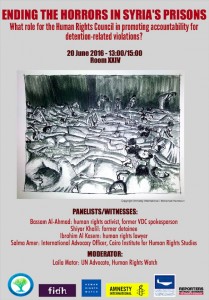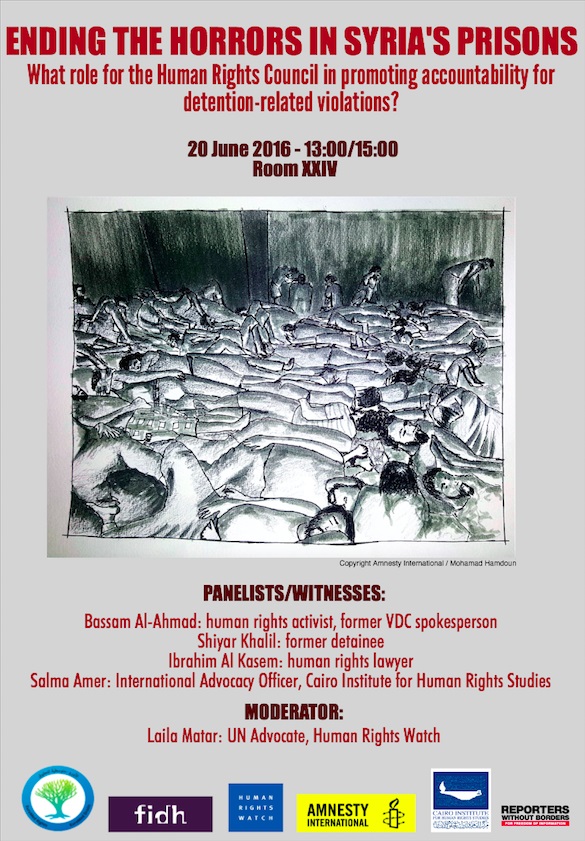On Tuesday evening, June 21st, the Cairo Institute for Human Rights Studies (CIHRS) delivered an oral intervention before the 32nd session of the United Nations Human Rights Council (HRC) currently convening in Geneva.
The oral intervention urged all states to accept a shared responsibility to investigate and prosecute arbitrary arrests and the kidnapping of innocent civilians in violation of international law in Syria. CIHRS also called upon the Human Rights Council to adopt a resolution that urges the relevant parties to release the arbitrarily detained, and to ensure safe, immediate and unconditional access to all prisons and other places of detention in the country. It further requested that the Council convenes a high level panel discussion during its upcoming session that would feature Syrian voices from the ground and witness testimonies to the crimes being committed in Syria.
Earlier this month, on June 10th, CIHRS has also addressed these recommendations in a joint letter sent to permanent representatives of Member and Observer States of the UN Human Rights Council in collaboration with the International Federation for Human Rights, Amnesty International, Human Rights Watch and EuroMed Rights.
 Moreover, CIHRS, in cooperation with EuroMed Rights, The International Federation for Human Rights, Human Rights Watch, Amnesty International, and Reporters Without Borders, organized a side event on June 20th entitled “Ending the Horrors in Syria’s Prisons: What role for the Human Rights Council in promoting accountability for detention-related violations?”. Speaking at the panel were Bassam Al-Ahmad, human rights activist and former spokesperson of the Violations Documentation Center (VDC), Shiyar Khalil, former detainee, Ibrahim Al Kasem, human rights lawyer, and Salma Amer, International Advocacy Officer at CIHRS. The discussion was moderated by Laila Matar, UN Advocate at Human Rights Watch.
Moreover, CIHRS, in cooperation with EuroMed Rights, The International Federation for Human Rights, Human Rights Watch, Amnesty International, and Reporters Without Borders, organized a side event on June 20th entitled “Ending the Horrors in Syria’s Prisons: What role for the Human Rights Council in promoting accountability for detention-related violations?”. Speaking at the panel were Bassam Al-Ahmad, human rights activist and former spokesperson of the Violations Documentation Center (VDC), Shiyar Khalil, former detainee, Ibrahim Al Kasem, human rights lawyer, and Salma Amer, International Advocacy Officer at CIHRS. The discussion was moderated by Laila Matar, UN Advocate at Human Rights Watch.
The panel highlighted the horrid conditions inside the different types of detention facilities in Syria, the torture techniques used against human rights defenders and journalists, as well as the conditions of courts. The speakers agreed that it is essential to draw attention to the situation of detainees in a form of a thematic resolution adopted by the Council. They further requested the release of formal lists of names of those detained as well as locations of those believed to be diseased. The speakers also called upon all relevant parties to grant access to all prisons and other places of detention to the CoI and humanitarian and human rights organizations.
Further calls made during the panel included calls to the Security Council to refer the situation in Syria to the ICC as well as to third party states to use their domestic jurisdiction based on the principle of universal jurisdiction to prosecute those responsible for grave breaches of international law against detainees.
Share this Post

